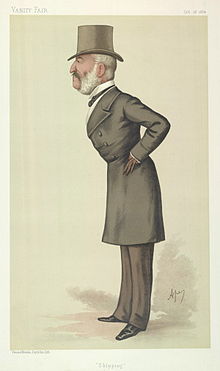- Sir Charles Palmer, 1st Baronet
-
For other people named Charles Palmer, see Charles Palmer (disambiguation).
 "Shipping". Caricature by Ape published in Vanity Fair in 1884.
"Shipping". Caricature by Ape published in Vanity Fair in 1884.
Sir Charles Mark Palmer, 1st Baronet (3 November 1822 – 4 June 1907) was an English shipbuilder born in South Shields. He was also a Liberal Party politician and Member of Parliament. His father, originally the captain of a whaler, moved in 1828 to Newcastle upon Tyne, where he owned a ship owning and ship-broking business.
Contents
Early life
At the age of 15 Charles Palmer entered a shipping business in the city. After six months, he travelled to Marseilles, France, where his father had procured him a post in a large commercial house, at the same time entrusting him with the local agency of his own business. After two years experience in Marseilles he entered his father's business in Newcastle, and in 1842 he became a partner.
His business capacity attracted the attention of a leading local colliery owner, and he was appointed manager of the Marley Hill colliery in which he became a partner in 1846. Subsequently he was made one of the managers of the associated collieries north and south of the Tyne owned by Lord Ravensworth, Lord Wharncliffe, the marquess of Bute and Lord Strathmore.
Emergence as an entrepreneur
Using the profits of the Marley Hill colliery, he gradually purchased the properties of his erstwhile employer, while simultaneously he greatly developed the recently established coke trade, obtaining the coke contracts for several of the large English and continental railways.
Establishment of Palmer's shipyard
Main article: Palmers Shipbuilding and Iron Company LimitedAbout 1850 the question of coal-transport to the London market became a serious question for north country colliery proprietors. Palmer therefore built, largely according to his own plans, the John Bowes, the first iron screw collier, and several other steam-colliers, in a yard established by him at Jarrow, then a small Tyneside village.
He then purchased iron mines in Yorkshire and erected large shipbuilding yards along the Tyne at Jarrow, including blast-furnaces, steel-works, rolling-mills and engine works, all on a massive scale. The firm produced warships as well as merchant vessels, and its system of rolling armour plates, introduced in 1856, was generally adopted by other builders.
In 1865 he turned the business into Palmer's Shipbuilding and Iron Company Limited.
Later life
At the 1874 general election, Palmer was elected as Liberal Party Member of Parliament (MP) for North Durham, and held the seat until its abolition for the 1885 general election. He was then elected for the new Jarrow constituency, and sat for the constituency until his death in London in 1907.
In 1886, Palmer's services in connection with the settlement of the costly dispute between British ship-owners and the Suez Canal Company (of which he was then a director) were rewarded with a baronetcy.
References
 This article incorporates text from a publication now in the public domain: Chisholm, Hugh, ed (1911). Encyclopædia Britannica (11th ed.). Cambridge University Press.
This article incorporates text from a publication now in the public domain: Chisholm, Hugh, ed (1911). Encyclopædia Britannica (11th ed.). Cambridge University Press.- Leigh Rayment's List of Baronets
- Leigh Rayment's Historical List of MPs
External links
- Hansard 1803–2005: contributions in Parliament by Sir Charles Palmer
Parliament of the United Kingdom Preceded by
Sir Hedworth Williamson
George ElliotMember of Parliament for North Durham
1874 – 1885
With: Lowthian Bell Feb-Jun 1874
George Elliot 1874–1880
John Joicey 1880–1881
George Elliot 1881–1885Constituency abolished New constituency Member of Parliament for Jarrow
1885 – 1907Succeeded by
Peter Francis CurranBaronetage of the United Kingdom New creation Baronet
(of Grinkle Park and Newcastle-upon-Tyne)
1886–1907Succeeded by
George Robson PalmerCategories:- 1822 births
- 1907 deaths
- English businesspeople
- English shipbuilders
- Baronets in the Baronetage of the United Kingdom
- Liberal Party (UK) MPs
- Members of the United Kingdom Parliament for English constituencies
- UK MPs 1874–1880
- UK MPs 1880–1885
- UK MPs 1885–1886
- UK MPs 1886–1892
- UK MPs 1892–1895
- UK MPs 1895–1900
- UK MPs 1900–1906
- UK MPs 1906–1910
Wikimedia Foundation. 2010.
